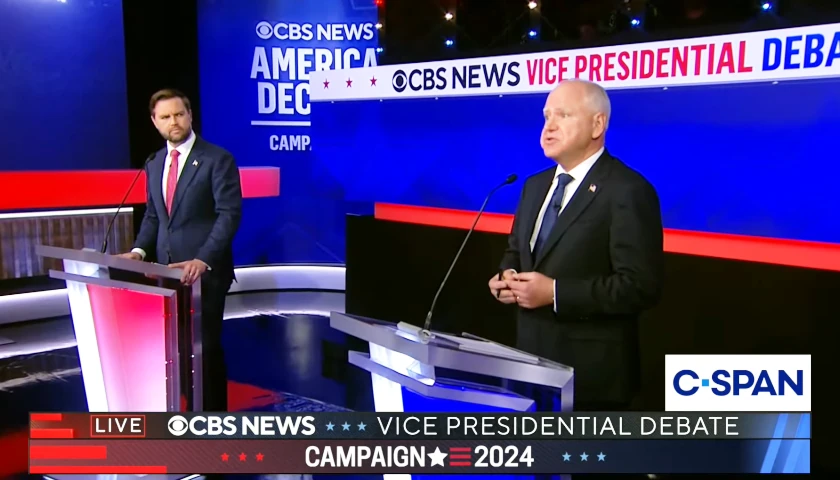Live from Music Row, Monday morning on The Tennessee Star Report with Michael Patrick Leahy – broadcast on Nashville’s Talk Radio 98.3 and 1510 WLAC weekdays from 5:00 a.m. to 8:00 a.m. – host Leahy welcomed Carrie Gress to the newsmaker line who is the author of a new book entitled The End of Woman, to talk about the problems of conservative women in today’s society.
Leahy: We are joined on the newsmaker line right now by Carrie Gress. She’s a fellow at the Ethics and Public Policy Center, a scholar at the Institute for Human Ecology at Catholic University, and she’s got a book coming out. I love this one. The End of Woman: How Smashing the Patriarchy has Destroyed Us. Carrie; welcome to The Tennessee Star Report.
Gress: Good morning. Thanks so much for having me.
Leahy: You are also a homeschooler, a homeschool mom of five children. Oh, my goodness.
Gress: I’m busy.
Leahy: You are very busy. You’ve got a terrific article up earlier last week at The Epoch Times. Conservatives’ Women Problem. What problem do we conservatives have with women?
Well, I think it’s fascinating. If we looked at the midterms, everybody seemed to be breaking towards the Republicans, except for one demographic, which is, of course, Democratic women, especially those who were single.
And I think we have a big problem because we’re not really reaching these women. A lot of them are very dependent on the government. And there’s this kind of cycle, this Julia cycle that we’ve gone into from, remember, the Obama administration.
And really where we’ve created women dependent on government, but we also haven’t given them, really, resources. Name one magazine that has been targeted toward conservative women. It’s all really focused on democratic cognition.
Leahy: By the way, that is an argument, Carrie. You know Glenn Reynolds at Instapundit, the professor. He makes that argument all the time. Buy a women’s magazine. That’d be a very good way to go. Now, also, you mentioned, Carrie, the Julia argument from the 2008 Obama campaign.
And when we saw that Julia was a single woman, basically the argument was, here are all the goodies that the government is going to give you. I looked at that and thought, oh, my gosh, nobody’s going to buy that. Guess what? (Gress chuckles) A lot of single women bought it.
Gress: Well, and it was nothing new really. What they were doing was just highlighting really what feminism has done for about 200 years. I went all the way back to Mary Wollstonecraft and looked really in a focused way at 200 years of history.
And the question that’s been asked is, how do we make women better women, but how do we make women into men? And we are finally seeing this play itself out. Really in the extreme form of what’s happening with our young girls and all this transitioning into boys.
And this is not an accident, but really just a result of 50, 60 years of focused effort on convincing women that they’re going to be better off and happier if they become like men instead of like women.
Leahy: Carrie, you’ve done a very good job of identifying the problem and analyzing the problem. Please help me. What, Carrie is the solution?
Gress: Yes, I mean, it’s super simple. I think this is the thing. It’s been right in front of us for so long. How did they destroy us? They’ve destroyed us through movies and Oprah and fashion magazines and pop music, all of this. And where have we been?
We haven’t done any of these things. In fact, this is one of the reasons why I started my own online blog and mercantile. It’s called the Theology of Home because we have to start giving women alternatives. Most women have no idea that there’s another way to live. They’ve just been sold this Julia lifestyle since they were born.
I know I was. And so many of us are recovering from it. But there are so many that have never heard that there’s a real alternative to it. So I think we need to get involved in the culture wars. I think we need to find ways to provide a different voice in a way that women can hear, instead of trying to do it just through politics or seemingly direct…
Leahy: You sound a little bit like the Andrew Breitbart of women’s magazines to me, which is…
Gress: (Chuckles) I love it.
Leahy: You like that?
Gress: No one’s ever said that, but I’m going to write that one down.
Leahy: Write it down now, your website, Theologyofhome.com. I think you’d like this to become a print magazine for women, is that right?
Gress: Oh, I’d love it to become a print magazine. I think it has all the beauty and all the elements that need to be there, the things that women are hungry for. I mean, this is the irony.
You can look at what’s popular in the culture. It’s things like baking and bread, gardening, knitting, all these things that really reflect what women have done in the past. And it’s called homemaking.
So that word, of course, is still taboo. But I think that these elements really speak to what is in women’s hearts, especially younger women who didn’t grow up seeing power suits and shoulder pads. I think they really want something different and deeper.
Leahy: Let me ask you this, Carrie. How long has Theologyofhome.com been up as a website?
Gress: About four, five years.
Leahy: And have you gone out and I’m just guessing, have you gone out and tried to raise money to turn it into a print magazine to compete with Glamor or all those others like Cosmo? Basically, I mean, Cosmo is all about how to have a better sex life, I guess it seems to me, from the headlines.
Gress: Yeah, we actually have published a number of books on this. We have a television series in the early stages of production. We’re not a nonprofit, but maybe we need to start that if people are interested in supporting it. We’ve just tried to be a nonprofit my whole life and I thought, I’m a busy mom, I don’t have time to go beg for money. So we’re going to figure out a way to do this in-house.
And so we’ve created a store that is self-sufficient with our blog and gets us paid. But there’s so much room for potential growth with this project. We’ve actually just largely because of our family demands, turned down a lot of investment money because there’s only so much I can do in a day.
But I think that making it a nonprofit and coming up with a way to actually make it a print magazine makes a lot of sense because it’s things like beautiful pictures. And we joke about our books that they have all these forbidden images because it’s pregnant women and families that look happy and dads that look competent. Because these are just the kind of images that we don’t see in the culture.
Leahy: Now, as a dad, let me just say hurrah for that, because every time you watch, like, a sitcom, the dad is a complete moron.
Gress: He’s an idiot. Yes.
Leahy: Dad is an idiot. And the wisdom is with the children.
Gress: Or the mom.
Leahy: Or the mom. But dads are idiots in nature, in all these stories. And by the way, you know, it kind of irritates me, that portrayal.
Gress: Yes, right. As it should. I think this is really part of the whole design, which is to sort of the pseudo empowerment of women while at the same time destroying men.
And it was from the very beginning, Mary Wollstonecraft talked about destroying the hierarchy and anything related to the military and the church. So these are old ideas that we just keep recycling and aren’t quite learning from yet.
Listen to today’s show highlights, including this interview:
– – –
Tune in weekdays from 5:00 – 8:00 a.m. to The Tennessee Star Report with Michael Patrick Leahy on Talk Radio 98.3 FM WLAC 1510. Listen online at iHeart Radio.
Photo “Carrie Gress” by Ethics and Public Policy Center. Background Photo “U.S. Capitol” by Thomas Lin.





